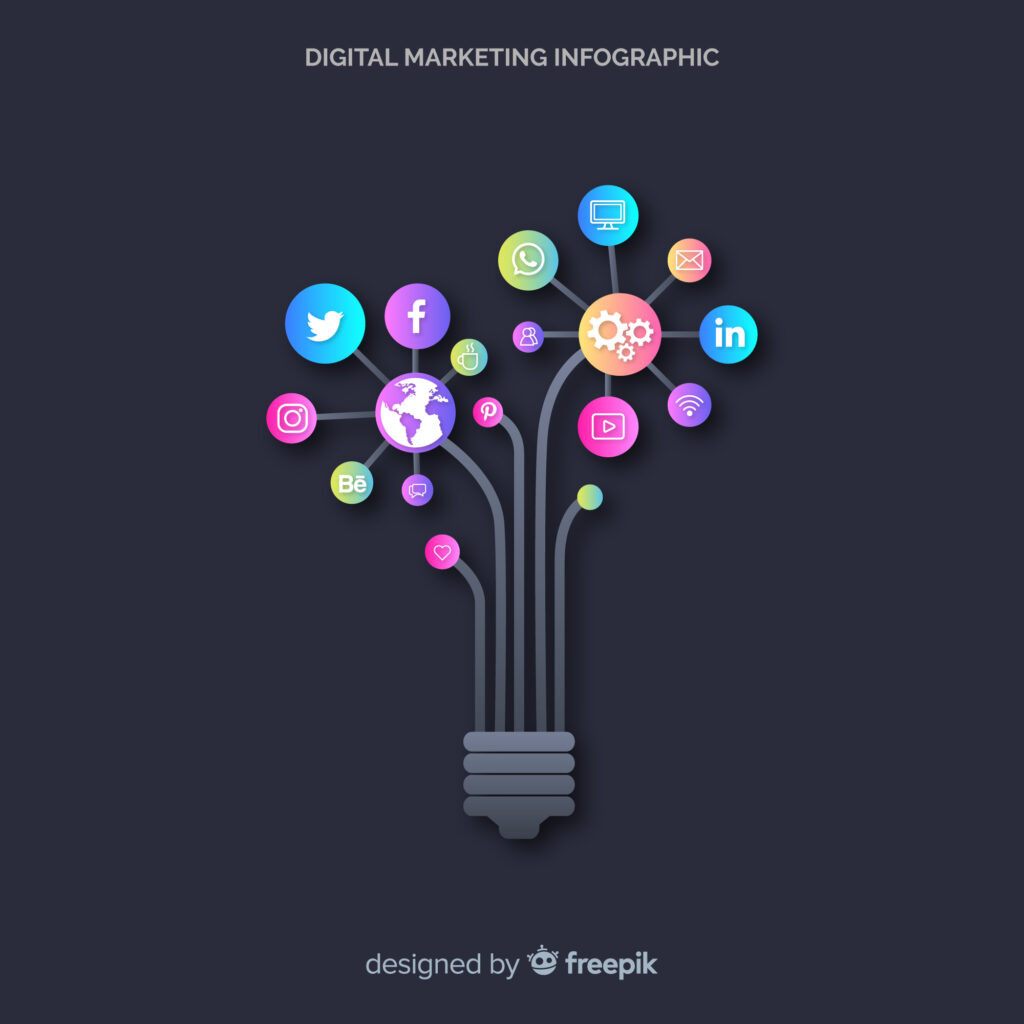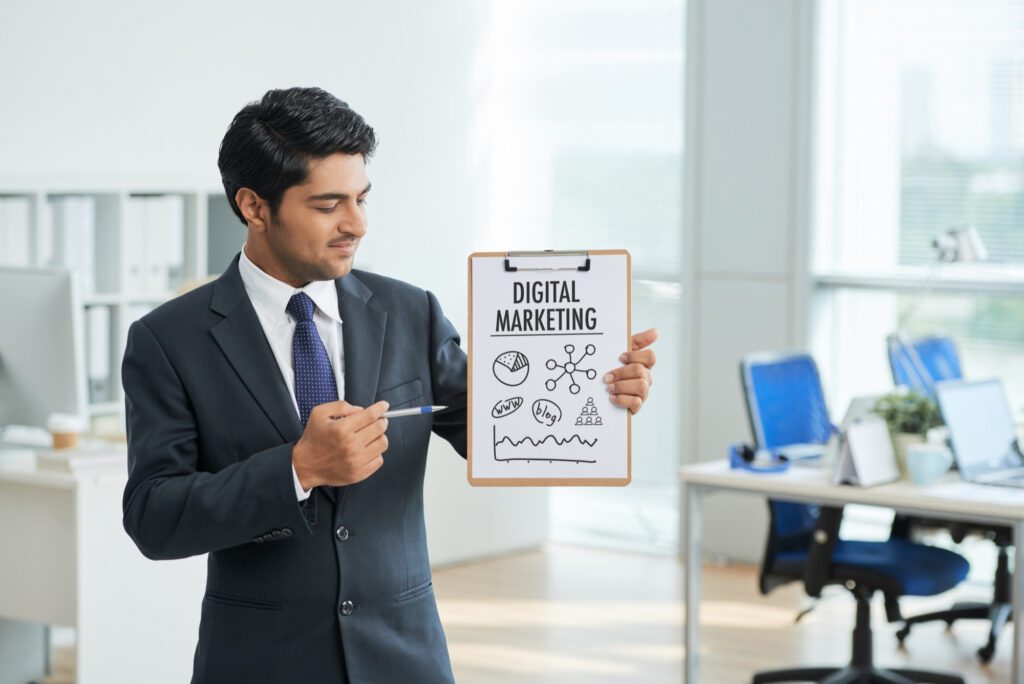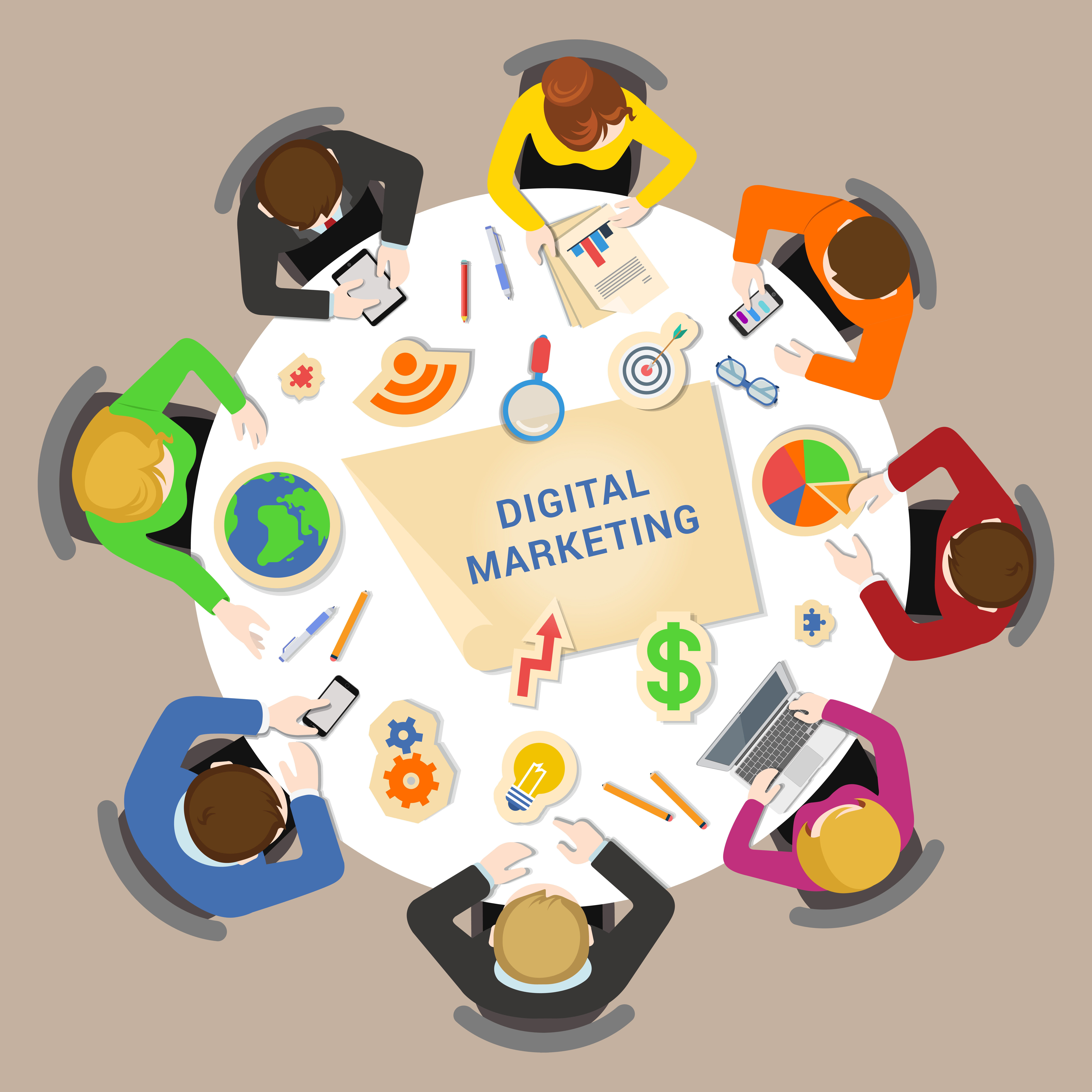Digital marketing involves the use of electronic media and digital technologies to promote products, services, and brands. It incorporates various internet techniques such as search engine optimization (SEO), social media marketing, content creation, and online advertising to reach consumer through digital platforms.
Table of Contents
What is Digital Marketing?
“Digital marketing” refers to the use of electronic media and the internet to reach customers and promote products and services. It includes a wide range of tactics and strategies, such as email marketing, social media marketing, search engine optimization (SEO), and online advertising.
The goal of digital marketing is to reach and engage with customers where they spend most of their time: online. By using digital channels and tools, businesses can connect with their customers and prospects, and build relationships with them in a more targeted and cost-effective way than traditional marketing methods.
Digital marketing allows businesses to track the performance of their marketing campaigns in real-time and make data-driven decisions based on the results. It also enables them to reach a global audience and adapt their marketing efforts to different markets and cultures.

Why Digital Marketing is so important?
Digital marketing is important for several reasons:
- Increased online presence: With the increasing use of the internet and mobile devices, more and more people are using the web to search for products and services. Having a strong online presence helps businesses reach these customers and build relationships with them.
- Cost-effective: Digital marketing is often more cost-effective than traditional marketing methods. For example, it can be more cost-effective to run a social media campaign than to print and distribute flyers.
- Measurable results: Digital marketing allows businesses to track the performance of their marketing campaigns in real-time. This makes it easy to see what’s working and what’s not, and make data-driven decisions to improve results.
- Targeted advertising: Digital marketing enables businesses to target specific groups of customers based on their interests, behaviors, and demographics. This allows businesses to reach the right people with the right message, at the right time.
- Greater engagement: Digital marketing allows businesses to build relationships with their customers and engage with them on a more personal level. For example, through social media, businesses can respond to customer inquiries and complaints in real-time, and interact with them through likes, comments, and shares.
Overall, digital marketing is important because it allows businesses to reach and engage with their customers in a more targeted and cost-effective way, and track the performance of their marketing efforts in real-time.
What are the main Assets and Tactics of Digital Marketing?
There are several assets and tactics that are commonly used in digital marketing:
- Website: A website is the foundation of a business’s online presence. It’s a place where customers can learn about the business, its products and services, and make purchases.
- Search engine optimization (SEO): SEO is the practice of optimizing a website to rank higher in search engine results pages (SERPs) for specific keywords. By optimizing a website for search engines, businesses can improve their visibility and attract more qualified traffic to their site.
- Social media: Social media platforms, such as Facebook, Twitter, and Instagram, allow businesses to connect with their customers and build relationships with them. These platforms can be used to promote products and services, engage with customers, and gather feedback.
- Email marketing: Email marketing involves sending targeted and personalized emails to a list of subscribers. It’s a cost-effective way to nurture leads, promote products and services, and build customer loyalty.
- Online advertising: Online advertising includes tactics such as pay-per-click (PPC) advertising, display advertising, and retargeting. These methods allow businesses to reach specific groups of customers with targeted ads.
- Content marketing: Content marketing involves creating and distributing valuable, relevant, and consistent content to attract and retain a clearly defined audience. This can be in the form of blog posts, videos, infographics, or social media posts.
These are just a few examples of the assets and tactics that can be used in digital marketing. The specific tactics and assets that a business uses will depend on its goals and target audience.

Types of Digital Marketing?
There are several types of digital marketing, including:
- Search engine optimization (SEO): SEO is the practice of optimizing a website to rank higher in search engine results pages (SERPs) for specific keywords.
- Pay-per-click (PPC) advertising: PPC advertising involves placing ads on search engine results pages or other websites, and paying each time someone clicks on the ad.
- Social media marketing: Social media marketing involves using social media platforms, such as Facebook, Twitter, and Instagram, to promote products and services, engage with customers, and gather feedback.
- Email marketing: Email marketing involves sending targeted and personalized emails to a list of subscribers.
- Content marketing: Content marketing involves creating and distributing valuable, relevant, and consistent content to attract and retain a clearly defined audience.
- Influencer marketing: Influencer marketing involves partnering with social media influencers, who have a large following, to promote products and services.
- Affiliate marketing: Affiliate marketing involves promoting products or services on behalf of another business, and earning a commission for each sale made through your referral.
- Video marketing: Video marketing involves creating and distributing videos to promote products and services.
- Mobile marketing: Mobile marketing involves using mobile devices and apps to reach customers and promote products and services.
- Local SEO: Local SEO involves optimizing a business’s online presence to rank higher in search engine results for local searches.
These are just a few examples of the types of digital marketing. The specific tactics and strategies that a business uses will depend on its goals and target audience.
Career in Digital Marketing?
A career in digital marketing can be rewarding and challenging, as it involves staying up-to-date with the latest trends and technologies in the industry. There are many different career paths in digital marketing, including:
- Search engine optimization (SEO) specialist: An SEO specialist helps businesses improve their ranking in search engine results pages (SERPs) by optimizing their website and online presence.
- Social media manager: A social media manager creates and implements social media campaigns, and manages a company’s social media accounts.
- Content marketer: A content marketer creates and distributes valuable, relevant, and consistent content to attract and retain a clearly defined audience.
- Email marketer: An email marketer creates and sends targeted and personalized emails to a list of subscribers.
- Digital marketing manager: A digital marketing manager is responsible for overseeing and coordinating all digital marketing efforts for a business.
- Paid media specialist: A paid media specialist specializes in paid advertising, such as pay-per-click (PPC) advertising, display advertising, and retargeting.
- Web designer: A web designer creates and designs websites, and ensures that they are user-friendly and visually appealing.
- Conversion rate optimization (CRO) specialist: A CRO specialist helps businesses improve the performance of their website and increase the number of conversions (such as sales or leads) it generates.
To pursue a career in digital marketing, it can be helpful to have a bachelor’s degree in marketing, communications, or a related field, and to gain experience through internships or entry-level positions. Continuing education and professional development, such as through online courses or industry certifications, can also be beneficial.

What are the benefits of Digital Marketing?
There are many benefits of digital marketing, including:
- Increased online presence: Digital marketing helps businesses reach customers and prospects where they spend most of their time: online. This increases a business’s visibility and helps it stand out from competitors.
- Cost-effective: Digital marketing is often more cost-effective than traditional marketing methods, such as print or broadcast advertising.
- Measurable results: Digital marketing allows businesses to track the performance of their marketing campaigns in real-time, making it easy to see what’s working and what’s not.
- Targeted advertising: Digital marketing enables businesses to target specific groups of customers based on their interests, behaviors, and demographics, allowing them to reach the right people with the right message.
- Greater engagement: Digital marketing allows businesses to build relationships with their customers and engage with them on a more personal level.
- Global reach: Digital marketing enables businesses to reach a global audience, making it possible to adapt marketing efforts to different markets and cultures.
- Improved customer experiences: Digital marketing can help businesses create personalized and seamless customer experiences, which can lead to increased customer loyalty and retention.
Overall, digital marketing allows businesses to reach and engage with their customers in a more targeted and cost-effective way, and track the performance of their marketing efforts in real-time.
What type of content would be right to create?
The type of content that is right to create depends on your business’s goals and target audience. Here are a few factors to consider when deciding what type of content to create:
- Purpose: What is the main goal of the content? Is it to educate, inform, entertain, or persuade?
- Audience: Who is the content intended for? What are their interests, needs, and preferences?
- Format: What is the best format for the content? Options include blog posts, articles, videos, infographics, podcasts, and social media posts.
- Distribution channels: How will the content be distributed? Will it be shared on social media, email, or a website?
- Consistency: How does the content fit with the overall brand and messaging of the business?
Some examples of types of content that businesses might create include educational articles, product demonstrations, customer testimonials, industry news, and behind-the-scenes videos. It’s important to keep in mind that the content should be valuable and relevant to the target audience, and aligned with the business’s goals.

Popular Digital Marketing Courses?
There are many digital marketing courses available online, ranging from beginner to advanced levels. Here are a few popular options:
- Google Analytics Academy: Google Analytics Academy offers free online courses on Google Analytics and other digital marketing tools. These courses are suitable for beginners and provide a foundation in digital marketing.
- HubSpot Academy: HubSpot Academy offers free online courses on a variety of digital marketing topics, including inbound marketing, email marketing, and social media.
- Digital Marketing Institute: The Digital Marketing Institute offers professional certifications in digital marketing, including the Certified Digital Marketing Professional (CDMP) and the Certified Digital and Social Selling Professional (CDSSP). These courses are suitable for those with some experience in digital marketing and are looking to advance their careers.
- Coursera: Coursera is an online learning platform that offers a wide range of digital marketing courses from top universities and institutions.LinkedIn Learning: LinkedIn Learning (formerly Lynda.com) offers a variety of digital marketing courses, including video tutorials and interactive exercises.
These are just a few examples of the many digital marketing courses available online. It’s important to research and compare different options to find the course that best fits your needs and goals.
FAQ
Here are answers to some frequently asked questions about digital marketing:
- What is digital marketing? Digital marketing refers to the use of electronic media and the internet to reach customers and promote products and services. It includes a wide range of tactics and strategies, such as email marketing, social media marketing, search engine optimization (SEO), and online advertising.
- Why is digital marketing important? Digital marketing is important because it allows businesses to reach and engage with their customers in a more targeted and cost-effective way, and track the performance of their marketing efforts in real-time. It also enables businesses to reach a global audience and adapt their marketing efforts to different markets and cultures.
- What are the types of digital marketing? There are several types of digital marketing, including search engine optimization (SEO), pay-per-click (PPC) advertising, social media marketing, email marketing, content marketing, influencer marketing, affiliate marketing, video marketing, mobile marketing, and local SEO.
- What are the benefits of digital marketing? The benefits of digital marketing include increased online presence, cost-effectiveness, measurable results, targeted advertising, greater engagement, global reach, and improved customer experiences.
- What are some popular digital marketing courses? Some popular digital marketing courses include the Google Analytics Academy, HubSpot Academy, Digital Marketing Institute, Coursera, and LinkedIn Learning.
Follow us on Google News.
